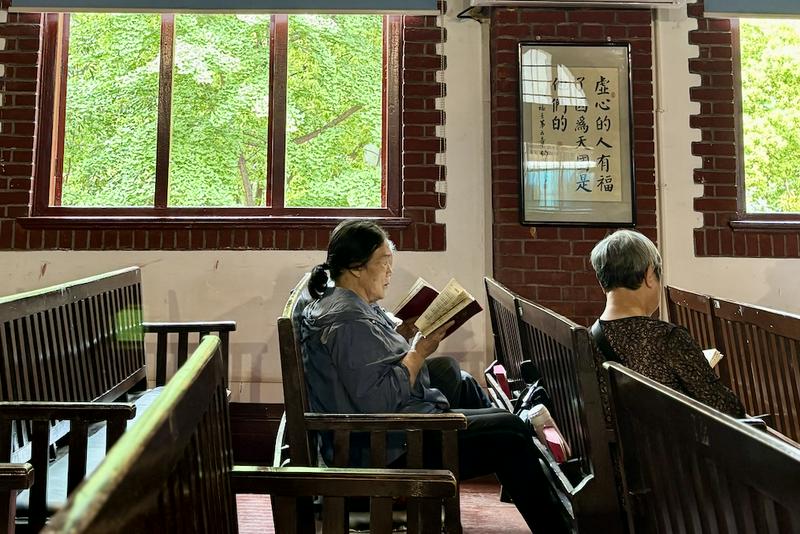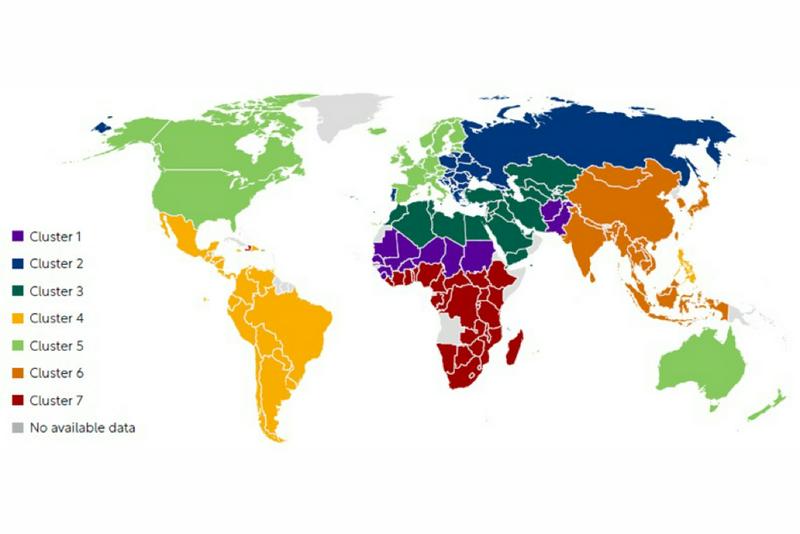A large-scale Bible attitude survey reveals that 76% of Asian people know nothing about the Bible, and 56% have never heard of it.
Conducted by Gallup in 2023 and 2024, the Patmos World Bible Attitudes Survey collected responses from 91,139 people across 85 countries and territories about how people relate to the Bible, representing 3.8 billion people worldwide.
Commissioned by the British and Foreign Bible Society (BFBS), the survey is the largest Bible engagement research project ever, focusing on "people's attitudes and beliefs about the Bible within special cultural, economic and religious contexts."
According to the official website, the name "Patmos" dates back 2,000 years to the island of Patmos, where "seven short letters were written to churches in seven distinct contexts, revealing a deeper insight into their spiritual condition."
The launch event of the survey took place on April 30. Arleen Luo, manager of Asia and Chinese Mission for the British and Foreign Bible Society, who oversees the work in Asia and looks after the Chinese diaspora, shared her insights about the survey and the Chinese mission in an interview with China Christian Daily.
Founded in 1804, BFBS was mainly funded by Lord Thomas Charles and Lord William Wilberforce. At first, it provided Bibles for people in England and Wales and encouraged them to read, love, and use God's word. Now it reaches out to the world, works with other societies and agencies, and promotes the Bible mission.
Considering the coverage in 80 countries, "the survey is a project that never happened in history," Luo said. BFBS worked for three years with many local Bible Societies, consultants, and experts from every continent, such as Barna Group, to complete this breakthrough survey. The methodology is to categorize countries into seven clusters.
In its global findings, the Patmos World Bible Attitudes Survey demonstrates that religion still matters globally, as many people say religion is an important part of their daily life, and the majority of the global population "believe in God or a higher power." More than 60% of people in the secular West believe in God, and 80% in Eastern Europe believe in a higher power.
"The Bible Society has been doing the Bible translation in two countries. One of our visions is that everyone in the world can access a Bible in their heart language, and we are going to achieve that by 2030," Luo said.
There is a mixed picture of Bible engagement: 75% of Christians across the globe are interested in learning more about the Bible, among whom those in Latin America and sub-Saharan Africa show the highest interest. Christians in minority contexts (like Muslim-majority countries) show high Bible use and confidence, but the lowest Bible use is found in European and Australasian contexts, where weekly use drops to varying degrees.
Non-Christians portray a surprising interest in the Bible: 11% of non-Christians show interest in learning more about the Bible, representing over 250 million people. Many say that the Bible might help with "life's big questions" or "spiritual growth."
"I think it's human nature to ask some big questions, no matter what, at some stage of life," Luo explained. "The research points out two major reasons: people think the Bible is a good resource to answer big life questions, and they think about how to nourish or enrich their personal spirituality."
Bible unawareness reaches 76% in Asia, where people know nothing about the Bible, and 56% have never heard of the Bible at all, particularly high in Indonesia, India, Vietnam, Cambodia, and Thailand.
"That's due to many reasons." She said that there are limitations and restrictions on how people can take or access the Bible in many Asian countries, including Muslim-predominant countries. "It's illegal to sell a Bible or give the Bible to somebody else."
"The [Protestant] church in general is still quite young, compared to the Roman Catholic Church. Then we are limited in many ways—resources, maturity, and understanding of the living circumstances. Some countries are under pressure, and sometimes we are under all kinds of dilemmas. So our outreach to non-Christians is quite limited." She added that there's also a great evangelism opportunity.
"If we look at the churches in Vietnam, they are a small, young Christian community lacking pastoral resources. Especially in recent years, they've been facing much pressure, basically from the authorities, making them vulnerable to try to reach out to people, so how can you expect they have a large awareness of the Bible?"
"We didn't get any data from China, which is another indication of tension," she continued. "We were very hopeful that we could do some form of research in China, but it seems to be very challenging, especially at the moment."
BFBS has many relationships with China. It gave the first foreign donation in 1811 to support Robert Morrison, the first Protestant missionary to China, to complete the second Protestant Chinese Bible translation in 1823. "Since then, we have been involved with supporting, helping, or directly engaging with the Bible mission amongst Chinese people for the Chinese language and all kinds of languages being used in China, for a very long time, even until now."
Working at the Department of the International Mission, she leads a small team to serve the Chinese diaspora, especially the growing Chinese communities in Britain.
But the Patmos Survey collected data from Singapore and Taiwan, where the Chinese ethnic group is predominant. Luo also cautioned that the two countries' data doesn't necessarily represent the Chinese population worldwide.
When it comes to young people, 70% of all respondents globally agree it's good for children to know Bible stories, and globally, Christians aged 18 to 24 are using the Bible more frequently than any other age group.
"We can say that the next generation, or young generations, will have almost like a universal theme that everybody cares about [the Bible]," Luo said. "The majority of the people in the world believe that the Bible has some positive power and it's a positive source for nurturing the younger generation, which is a good sign."
The Patmos World Bible Attitudes Survey has an ambitious goal: understanding how contemporary society engages the Bible for transformation, as when people encounter God's word, their lives will be changed for good.
Luo also introduced the two-stage process behind the survey. Stage one was identifying the clusters. "If you think of the world as a round cake, our first stage is how we slice the cake by what kind of criteria." According to the cultural, ideological context, and socio-economic factors, the world is sliced into seven clusters or mission contexts: Sahel, Central and Eastern Europe, North Africa/Middle East/Central Asia, Latin America, the secular West, South and East Asia, and Sub-Saharan Africa.
Since Asia owns the biggest and most diverse global population, the continent is divided into four sub-clusters: the secularized context, the Muslim-predominant context, the Buddhism-predominant context, and a strong Hindu background.
The second stage was to conduct one-to-one interviews or online surveys due to some limitations in some countries. "We collected the effective response from 91,000 people to help us establish a general understanding of how people see and use the Bible as the religious dynamics in the seven clusters."
For example, representing South and East Asia, Cluster 6 refers to a diverse religious context with low awareness of the Bible and a stable Christian minority, including 19 countries and regions: Cambodia, India, Japan, South Korea, Laos, Malaysia, Mauritius, Mongolia, Myanmar, Nepal, Singapore, Sri Lanka, Thailand, Vietnam, Indonesia, Bangladesh, Hong Kong, and Taiwan.
Statistics show that 56% in this cluster have never heard of the Bible; 73% say religion is an important part of their daily lives; 47% agree they would be happy for a child in their family to attend a school connected to a different religion from their own; and 6% are interested in learning more about the Bible.
After looking at all the data, Luo reflected, "Now, the question comes to the people like us, the Bible Societies, missionaries, or churches: What is our role in this global trend? What can I do in my local community, or in my capacity? What is my unique calling on this?"
"But from me, observing the churches, not only Chinese churches, but global churches, the most frequent question I get is that once the people see those figures and pictures, they will ask us, 'What does that mean?' and 'So what?'"
She said that the research is a great tool to show what the landscape looks like and to point out the strategic direction in terms of vision. "But the research cannot answer the question: what do we need to do next, or so what? Because that's a task for the people to use the research as one of the tools to help them think deeper, pray, and share God's vision for that discernment and wisdom to know what's next for them."
She introduced BFBS's Bible Engagement Forum, which has been going for the fourth year. It's a platform for individuals and organizations to gather ideas, share understanding, pray, and plan together to increase Bible engagement. There's a special forum for this survey named the Patmos Forum for Bible Engagement.
In the end, Luo gave her blessings to the church in China: "We are a universal church. The church in China is not alone, but we should remember that the Chinese church, at the beginning, was established by foreign missionaries. There are so many people deeply caring and supporting our brothers and sisters in China in prayers and actions. We remember all of them day by day."














